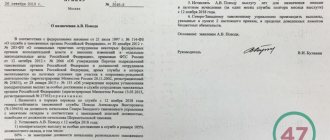The head of the North-West Customs Administration (NWCU), Alexander Getman, was dismissed on September 27 due to loss of trust. Ivbg.ru will tell you about the high-profile events that took place at NWTU during the reign of Hetman
You might be interested
Head of North-West Customs Getman resigned due to loss of confidence
As it became known to ivbg.ru, the head of the federal customs service, Mr. Bulavin, signed an order to dismiss Alexander Getman, head of the North-Western Customs Department Several...
27.09.2018 5568
short biography
Ex-head of North-West Technical University Alexander Getman
Alexander Getman began his service in the customs authorities in 1990 as an inspector at Pulkovo customs. Then he held the positions of senior inspector, leading inspector, deputy and head of department of the Pulkovo customs, deputy head of the post of St. Petersburg customs.
Since February 2002, he was deputy head of the department for organizing customs clearance and customs control of the North-West Technical University, and then, since 2005, head of the department for organizing customs control.
In December 2007, he was appointed first deputy head of the North-Western Technical University for customs control. Since April 2009, Getman has been appointed deputy head of the Southern Customs Department. A month later, he served as acting head of the Southern Customs Administration (SCU). From June 2009 to May 2015, Getman served as head of YuTU.
By Order of the Federal Customs Service of Russia dated April 21, 2015 No. 1145-K “On the performance of duties by A.N. Getman”, an acting Head of the North-West Customs Administration since May 18, 2015. And since June 2015, Alexander Nikolaevich held the post of head of the North-West Customs Department.
Over the course of three years, many different high-profile events took place at the North-Western Customs, which Hetman headed, which did not go unnoticed.
I'm worried about alcohol
Khavronov, according to PROVED sources, had business connections with a major St. Petersburg businessman, co-owner of the holding company Dmitry Mikhalchenko. He was arrested in March 2021 for smuggling strong alcohol.
The investigation believes that he organized the smuggling of whiskey, wine and grappa into his St. Petersburg restaurants. According to the investigation, the products were purchased from the European Union, assembled in the port of Hamburg and transported to Russia under the guise of sealant.
Together with Mikhalchenko, his deputy at the Forum, Boris Korevsky, and director Anatoly Kindzersky are involved in the case. Another person involved in this case, the director of South-Eastern Trading Company LLC Ilya Pichko, was killed in December last year.
Mikhalchenko partially admitted guilt, even compensated for the damage caused to the state - 18 million rubles in unpaid taxes and customs duties, but in every possible way denies that he organized a criminal community.
At the beginning of September 2018, Alexander Getman gave testimony in the Basmanny Court of Moscow in the Mikhalchenko case. The businessman, according to investigators, turned to the head of the North-West Technical University for help after he was seized with alcohol. The general did not deny knowing the businessman and even said that he actually called when the cargo was detained, was interested in the fate of the alcohol, but did not seem to ask for help, did not even hint, he was simply worried about the alcohol.
The Mikhalchenko case damaged the careers of many high-ranking FCS officials; in particular, it became one of the reasons for the resignation of the head of the FCS, Andrei Belyaninov, who appointed Alexander Getman as head of North-West Technical University.
Kingisepp customs scandals
In early March, FSB officers detained the head of Kingisepp customs, Sergei Slepukhin. Early in the morning, March 2, in the Leningrad region, counterintelligence officers conducted a search in the office of the head of the Kingisepp customs, Slepukhin.
The search was short-lived, only a few hours, and what the operatives were looking for is unknown. But then information appeared that the reason for the visit was a nine-month-old story about the disappearance of three containers of meat from temporary storage warehouses. As follows from the explanations of the customs officers, the dogs ate the meat. Nothing further was reported about the missing products. After the search, the head of customs was taken to St. Petersburg to Liteiny, 4, and after interrogation was released.
Then, on March 6, security forces searched Alexander Bezlyudsky’s workplace and office. SEB operatives came to him as part of a criminal case initiated under Article 290 of the Criminal Code of the Russian Federation “Taking a bribe.”
At the time of the inspection, they decided not to punish Sergei Slepukhin, but on March 20 he himself resigned from the customs authorities after FSB searches took place in his office. But already in May, the Kingisepp City Court sent the former head of Kingisepp customs under arrest for two months on suspicion of receiving a large bribe.
Alexander Getman
Born in 1939. He graduated from the Leningrad State Institute of Theatre, Music and Cinematography twice: the acting department (class of Prof. B. Zhukovsky) in 1964 and the directing department (class of Prof. A. Katsman and associate professor M. Rechels) - in absentia in 1973. After graduating from acting faculty, he worked as an actor for almost ten years at the Riga Russian Drama Theater, which was directed by the wonderful director A. Katz. It was at this time that the Riga theater was one of the best theaters in the country. Very soon, the young actor Alexander Getman took his place in the troupe, which belonged only to him. He outplayed all the young heroes - from the “Rozovsky” boys to the heroes of Eduardo de Filippo. Riga criticism noted the artist’s excellent qualities: lyricism, musicality, plastic expressiveness and a subtle sense of genre and style. In parallel with the acting A.V. Getman also began to engage in directing activities: first as an assistant, then as a director under the director. Having graduated from the directing department, A.V. Getman stages performances in various theaters across the country, including the Leningrad Drama and Comedy Theater (now the Liteiny Theater, which he directs). But the young specialist was always cramped within one profession. In addition to the theater, he is actively involved in cinema: he writes scripts, produces documentaries (“Rolly”, “Search for the Wind”) that have received the highest international awards (Prize “For the best script” at the Tashkent All-Union Documentary Film Festival, the prize “For the best narration text for film" at the World Documentary Film Festival "Man and the Sea" (Krakow, Poland)). In 1975, G. Oporkov became the chief director of the Leningrad Theater. Lenin Komsomol - invites A.V. Getman to the theater as head of the literary department. This event largely determined the further creative activity of A.V. Getman. Very soon a circle of young authors was formed in the theater, attracted by Getman, whose first plays he edited and promoted to the stage. This is how the famous “new wave” of Leningrad drama began. The first play by L. Razumovskaya “Dear Elena Sergeevna” was staged at the Theater named after. Lenin Komsomol, and then in another 150 theaters across the country and around the world. Here, in Lenkom, the first plays of A. Galin, S. Zlotnikov, O. Danilov, A. Obraztsov and other St. Petersburg residents received a start in life. Largely thanks to A.V. Hetman at this time the theater named after. Lenin Komsomol took a serious step in its creative development. G. Oporkov in collaboration with A.V. Hetman created performances that brought wide fame to the theater: “His Whole Life”, “Money for Maria”, “Duck Hunt”, “The Seagull”, etc. Since 1981, A.V. Getman is the head of the literary department of the Maly Drama Theater, which is directed by E. Padve. For two years, with the active participation of A.V. Getman produced the plays “The Law of Eternity”, “Fiesta”, “Provincial Anecdotes”, etc. In 1983, the theater was headed by L. Dodin. A creative marathon begins to create the epic “Brothers and Sisters”, in which the assistant to the chief director for the literary part A.V. is actively involved. Hetman. Knowledge of the theater at its various levels allowed the director to provide effective assistance to the director not only in the literary part. “Zavlit is not a profession, but a position, thanks to which you can do a lot of good and benefit for the theater. Everything depends on the scale of the individual,” this is how A.V. defined his position on this issue. Getman in one of his interviews. The desire for independence and success in the literary field force A.V. Hetman left the service in 1987. In the next decade he wrote a lot for theater and cinema. His plays and dramatizations are readily staged by theaters, and feature films and documentaries are based on his screenplays. The film “Jewish Street,” created in collaboration with the outstanding documentary filmmaker Hertz Frank, is shown all over the world, receiving the most prestigious awards. It was at this time that a long-term creative friendship began with A.V. Ge. They proposed the idea of staging “Steep Route” based on the prose of E. Ginzburg (Russian State Prize for 1990), and later the idea of staging “Three Comrades” based on Remarque. Both performances directed by G. Volchek are still successfully performed in the theater. Feature film “The Happy Loser”, where A.V. Getman acted as a screenwriter and received first prize at the All-Union Vyborg Film Festival, a critic's award at the Berlin Film Festival and an honorable mention at the Chicago Film Festival. To A.V. Getman became famous in the theater world as a theater figure and the author of many talented ideas. In 1997, at the invitation of the Liteiny Theater A.V. Getman heads the artistic department of the theater. Before this, the theater was without an artistic director and chief director for three years. The repertoire was random, there was not a single title in the portfolio. The actors walked around without work, the auditorium was one third full. With the arrival of A.V. The Getman Theater changed its artistic policy. The abandonment of the institution of chief director entailed the active attraction to the theater of not only outstanding representatives of St. Petersburg directing, but also young, promising directors. Thanks to the authority of A.V. Hetman and both responded to his call. At the same time, the theater troupe was strengthened. 3-4 plays were rehearsed in the theater at the same time. In 1998, Klim’s play “The Moon for the Stepsons of Fate” received the highest national theater award “Golden Mask” in the “Critics Prize” category. In 2000, the play “The Forest” directed by G. Kozlov was awarded the State Prize of Russia. The farce “The Rubber Traders” by Hanoch Levin, proposed to the artistic council for production, was categorically rejected. But A.V. The hetman insisted. A year later, the theater released this farce called “Lost in the Stars” directed by G. Dityatkovsky. In 2001, the performance received two “Golden Masks” in the categories “Best Dramatic Performance of a Large Form” and “Best Director’s Work.” The main qualities of A.V. Getman's ability as an artistic director is the ability to accurately define a repertoire idea, captivate the team with it, create the necessary team of creators for its implementation, and vigilantly monitor the stages of work. Such patronage without forcible “headmaster” intervention has become the norm in the creative life of the theater. A.V. The Hetman has opened wide opportunities for creative work for young people. As part of the project “Theater Workshop on Liteiny”, graduates of the Theater Institute try their hand at it. It was within the framework of the “Workshop” that the premiere of the play “Oedipus the King” took place in March 2002, which immediately received recognition from the public and theater critics in the form of numerous festival awards, including the Highest National Theater Award “Golden Mask”. In 2004, A.V. Getman became one of the organizers and leaders of the All-Russian Theater Festival “Five Evenings” named after. Alexandra Volodina. The very first festival opened at the Liteiny Theater showed how necessary such a festival is in preserving the traditions of Russian theater. Currently A.V. Hetman is in the prime of his creative powers. Since 2001, he has not only been the artistic director, but also the director of the theater. Under his leadership, the Liteiny Theater became very attractive to the public and respected by the theater community; a theater with a strong and talented troupe capable of solving the most complex artistic problems put forward by modern directing.







